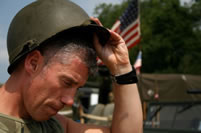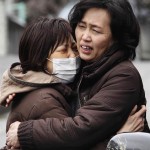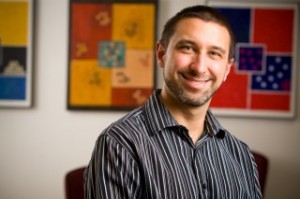Published: August 16, 2011

Image:Istockphoto
A new post-traumatic stress disorder (PTSD) prediction tool, developed by Geisinger Health System researchers, is simple to administer and appears to outperform other screening methods, according to new findings published electronically in the August issue of the journal General Hospital Psychiatry.
After collecting information from more than 2,300 adults following the Sept. 11, 2001, terrorist attack on the World Trade Center, Joseph Boscarino, Ph.D., MPH, senior investigator II, Geisinger Health System, and his co-investigators, including Charles Figley, Ph.D., Tulane University, examined the clinical factors that could predict PTSD. These included stressor exposures, psychosocial resources, functional status, depression symptoms, suicidal thoughts, PTSD symptoms and demographics. This was done to identify the best PTSD prediction models. [continue reading…]
Published: March 17, 2011

Hiroaki Ono / AP
all-to-wall news media coverage of the Japan and Canterbury earthquake disasters could put people at greater risk of developing traumatic reactions, a clinical psychologist says.
Ian de Terte, from the School of Psychology, specializes in vicarious trauma – where people are exposed to traumatic incidents through secondary means, such having personal involvement with victims or following news reports of devastating and tragic events.
This can apply to emergency workers, health practitioners and others dealing directly with the dead, the injured, the bereaved and other victims, but even those watching, reading and listening to the news can be just as much at risk, Mr de Terte says.
He says the phenomenon, also known as compassion fatigue, has similar symptoms to post-traumatic stress disorder. “It’s through watching disaster coverage and listening to it over and over again, you’re at greater risk of developing symptoms similar to PTSD.” [continue reading…]
Published: October 14, 2010

University at Buffalo researcher Michael Poulin says rescue of the Chilean miners provides a worldwide lesson in human resilience.
While many people might assume that the men rescued from the mine in Chile might suffer from psychological problems that require therapy, the miners’ survival of the ordeal may actually provide a worldwide lesson on the remarkable strength of human resilience, says a University at Buffalo researcher. [continue reading…]
Published: September 29, 2010

Almost a decade of war in the Middle East with its numerous deployments, the physical and emotional strain of combat and long periods of separation from loved ones has taken its toll. According to a recent study in the Archives of General Psychiatry, Posttraumatic Stress Disorder (PTSD) rates now range between 20-30 percent for those who served in Iraq and Afghanistan.
A study led by PTSD researchers Barbara Rothbaum, PhD, ABPP, and Kerry Ressler, MD, PhD, and funded by the National Institute of Mental Health (NIMH) is currently under way at Emory, testing the combination of the drug d-cycloserine (DCS) with virtual reality therapy to help alleviate the symptoms of PTSD. [continue reading…]



